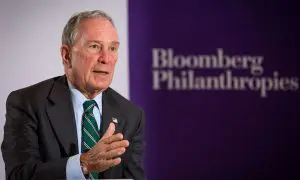 Michael Bloomberg, one of the world’s richest men, versus Philip Morris International (PMI), one of its most powerful companies – a battle of the big beasts is looming over the future of tobacco science and regulation.
Michael Bloomberg, one of the world’s richest men, versus Philip Morris International (PMI), one of its most powerful companies – a battle of the big beasts is looming over the future of tobacco science and regulation.
The anti-tobacco organisation announced this week by billionaire media mogul Bloomberg is intended to combat the PMI-backed Foundation for a Smoke-Free World (FSFW). It is a move likely to increase the sharp divide between those who welcome the tobacco industry’s involvement in reduced-risk alternatives and those who want to see Big Tobacco excluded from the regulatory and public-health debate entirely.
Bloomberg’s group is to be called STOP ̶ Stopping Tobacco Organizations and Products. With around $20m in initial funding, it will aim to counter the “deceptive strategies of the tobacco industry”.
According to the umbrella group Bloomberg Philanthropies, the new tobacco watchdog will create reports detailing tobacco industry tactics and strategies, globally and at national level, and will provide tools and training materials for countries to combat industry influence.
“STOP will support the creation of a robust global monitoring system that complements existing efforts in identifying industry deception,” Bloomberg Philanthropies said.
Bloomberg indicated clearly that the aim of the new group is to counter the FSFW, which has drawn criticism for the involvement of PMI. The tobacco giant has pledged to put $80m a year into the foundation, which offers money for research.
Some public health experts, however, view it with suspicion as perhaps another example of the tobacco industry leading regulators by the nose. Some groups have refused outright to accept funding from FSFW for this reason.
‘Fake science, fake news’
Bloomberg is reported to have said that he considers the FSFW a means for tobacco firms to promote “fake science as well as fake news”. He made the remark at the 17th World Conference on Tobacco or Health in Cape Town, South Africa, where he announced the plan for STOP.
Accusations of shoddy clinical trials for the heated tobacco product IQOS have dogged PMI’s image since late last year. PMI says it intends to substantially grow the smoke-free products side of its business, which now represents about 4% of its total volume, according to internal PMI figures.
Bloomberg, who is currently the World Health Organization (WHO) global ambassador for noncommunicable disease, has pledged about $1bn since 2007 to combat tobacco use worldwide, according to the Bloomberg Philanthropies website. Recipients include the Campaign for Tobacco-Free Kids, a noted foe of e-cigarettes.
Bloomberg has said that he considers the science that props up smoke-free alternatives to be only a “smokescreen for behaviour that has led to worse outcomes for smokers”.
One of the richest men in the world, he was also responsible for introducing wide-ranging public smoking bans while mayor of New York, a position he held for 12 years from 2002.
WHO director-general Tedros Adhanom Ghebreyesus said: “STOP is a warning call to Big Tobacco that they are on notice. The World Health Organization and our partners will not accept efforts to undermine the huge successes in tobacco control that we have achieved over the past few decades. There is no going back.”
What This Means: The Bloomberg initiative will doubtless exacerbate the already rancorous divide between those – like the organisers of the conference where it was announced, and like the WHO – who vigorously oppose any involvement of the tobacco industry in finding solutions to the problem of smoking, and those who believe it is better to have tobacco at the table participating in the discussion.
It has been apparent since its launch that anti-tobacco activists would portray the FSFW as irrevocably tainted by its funding from PMI, although many harm reductionists have welcomed it, if cautiously. The launch of the Bloomberg alternative confirms that there is little prospect of the two camps compromising.
̶ Daniel Mollenkamp ECigIntelligence staff







